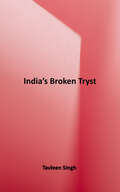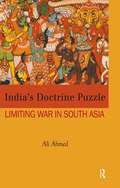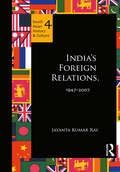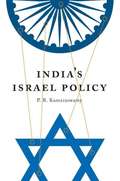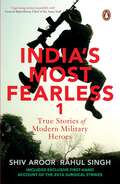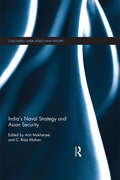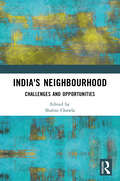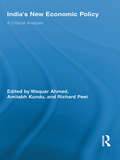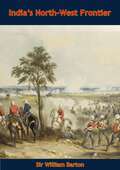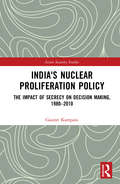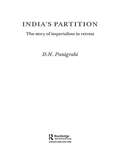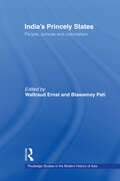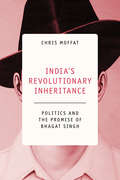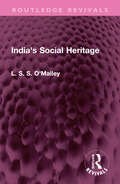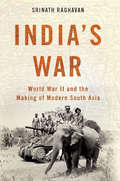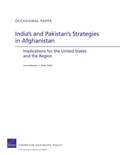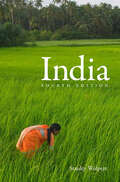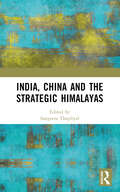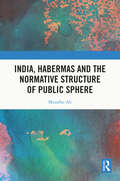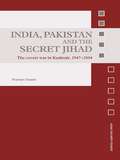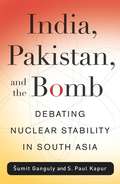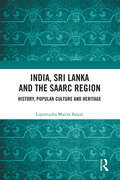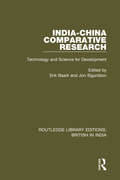- Table View
- List View
India's Broken Tryst
by Tavleen SinghSeventy years after Nehru’s beautiful midnight speech – ‘Long years ago we made a tryst with destiny…’ – in Indian cities and villages millions survive on less than the bare minimum. Children are not in classrooms, women have nowhere safe to relieve themselves, and jobless men lie around in a daze. In cities, where initiative should flourish, a merciless state looms large over every common endeavour. The civilization that was India, that grand culture, has not found utterance again. Long years after freedom from the British, why do we remain suppressed? In India’s Broken Tryst, bestselling author and popular political columnist Tavleen Singh chronicles the damage done. Here is the story of Surekha, who lives on the pavements of Mumbai’s landmark Marine Drive with memories of crushing hunger. Of Ali, the idli seller who is forced out of his honest livelihood by cops and corporators. Of Sahib and Sardar, little boys torn from their mother on the criminal charge of begging. Of those nameless servants who do not have access to toilets even as they service the luxury apartments where Singh lives. From the very poor to the very rich, Tavleen Singh catalogues in bold, eviscerating detail the systematic unmaking of our sense of destiny. Can an Indian dream stretch beyond food and water, literacy, toilets, and in some cases just a document of identification? If not, what destiny?
India's Doctrine Puzzle: Limiting War in South Asia
by Ali AhmedThe balance of power in South Asia is tenuous. Neighbouring states with nuclear arsenal pose a serious threat in times of conflict and the danger of escalation into a nuclear holocaust in South are ever-present. This book locates the change in India’s war doctrine at the turn of the century, following the Kargil War in 1999 between India and Pakistan. It examines how war policy was shaped by the threat posed by India’s neighbours and the need for greater strategic assertion. It also reveals that this change was forced by the military’s need to adapt itself to the nuclear age. Finally, it raises questions of whether the Limited War doctrine has made India more secure. An astute analysis of not only India’s military strategy but also of military doctrine in general, this book will be valuable to scholars and researchers of defence and strategic studies, international relations, peace and conflict studies, South Asia studies as well as government and military institutions.
India's Foreign Relations, 1947-2007: India's Foreign Relations, 1947-2007 (South Asian History and Culture)
by Jayanta Kumar RayThis book analyses India’s relations with its neighbours (China, Pakistan, Bangladesh, Sri Lanka) and other world powers (USA, UK, and Russia) over a span of 60 years. It traces the roots of independent India’s foreign policy from the Partition and its fallout, its nascent years under Nehru, and non-alignment to the influence of economic liberalization and globalization. The volume delves into the underlying reasons of persistent problems confronting India’s foreign policy-makers, as well as foreign-policy interface with defence and domestic policies. This book will be indispensable to students, scholars and teachers of South Asian studies, international relations, political science, and modern Indian history.
India's Israel Policy
by P. R. KumaraswamyIndia's foreign policy toward Israel is a subject of deep dispute. Throughout the twentieth century arguments have raged over the Palestinian problem and the future of bilateral relations. Yet no text comprehensively looks at the attitudes and policies of India toward Israel, especially their development in conjunction with history. P. R. Kumaraswamy is the first to account for India's Israel policy, revealing surprising inconsistencies in positions taken by the country's leaders, such as Mahatma Gandhi and Jawaharlal Nehru, and tracing the crackling tensions between its professed values and realpolitik. Kumaraswamy's findings debunk the belief that India possesses a homogenous policy toward the Middle East. In fact, since the early days of independence, many within India have supported and pursued relations with Israel. Using material derived from archives in both India and Israel, Kumaraswamy investigates the factors that have hindered relations between these two countries despite their numerous commonalities. He also considers how India destabilized relations, the actions that were necessary for normalization to occur, and the directions bilateral relations may take in the future. In his most provocative argument, Kumaraswamy underscores the disproportionate affect of anticolonial sentiments and the Muslim minority on shaping Indian policy.
India's Israel Policy
by P. R. KumaraswamyIndia's foreign policy toward Israel is a subject of deep dispute. Throughout the twentieth century arguments have raged over the Palestinian problem and the future of bilateral relations. Yet no text comprehensively looks at the attitudes and policies of India toward Israel, especially their development in conjunction with history.P. R. Kumaraswamy is the first to account for India's Israel policy, revealing surprising inconsistencies in positions taken by the country's leaders, such as Mahatma Gandhi and Jawaharlal Nehru, and tracing the crackling tensions between its professed values and realpolitik. Kumaraswamy's findings debunk the belief that India possesses a homogenous policy toward the Middle East. In fact, since the early days of independence, many within India have supported and pursued relations with Israel. Using material derived from archives in both India and Israel, Kumaraswamy investigates the factors that have hindered relations between these two countries despite their numerous commonalities. He also considers how India destabilized relations, the actions that were necessary for normalization to occur, and the directions bilateral relations may take in the future. In his most provocative argument, Kumaraswamy underscores the disproportionate affect of anticolonial sentiments and the Muslim minority on shaping Indian policy.
India's Most Fearless True Stories of Modern Military Heroes: True Stories Of Modern Military Heroes
by Rahul Singh Shiv AroorThe Army major who led the legendary September 2016 surgical strikes on terror launch pads across the LoC; a soldier who killed 11 terrorists in 10 days; a Navy officer who sailed into a treacherous port to rescue hundreds from an exploding war; a bleeding Air Force pilot who found himself flying a jet that had become a screaming fireball . . . Their own accounts, or of those who were with them in their final moments. India's Most Fearless covers fourteen true stories of extraordinary courage and fearlessness, providing a glimpse into the kind of heroism our soldiers display in unthinkably hostile conditions and under grave provocation.
India's Naval Strategy and Asian Security (Cass Series: Naval Policy and History)
by C. Raja Mohan Anit MukherjeeThis book examines India’s naval strategy within the context of Asian regional security. Amidst the intensifying geopolitical contestation in the waters of Asia, this book investigates the growing strategic salience of the Indian Navy. Delhi’s expanding economic and military strength has generated a widespread debate on India’s prospects for shaping the balance of power in Asia. This volume provides much needed texture to the abstract debate on India’s rise by focusing on the changing nature of India’s maritime orientation, the recent evolution of its naval strategy, and its emerging defence diplomacy. In tracing the drift of the Navy from the margins of Delhi’s national security consciousness to a central position, analysing the tension between its maritime possibilities and the continentalist mind set, and in examining the gap between the growing external demands for its security contributions and internal ambivalence, this volume offers rare insights into India’s strategic direction at a critical moment in the nation’s evolution. By examining the internal and external dimensions of the Indian naval future, both of which are in dynamic flux, the essays here help a deeper understanding of India’s changing international possibilities and its impact on Asian and global security. This book will be of much interest to students of naval strategy, Asian politics, security studies and IR, in general.
India's Neighbourhood: Challenges and Opportunities
by Shalini ChawlaIndia’s neighbourhood has witnessed crucial developments in the last decade: complex security challenges, looming economic crises, socio-political unrest, border clashes, China’s expanding engagement, India’s rising profile, and the COVID-19 pandemic. Over the last eight years, India has advocated the “Neighbourhood First” policy which ‘focuses on creating mutually beneficial, people-oriented, regional frameworks for stability and prosperity’. India’s neighbourhood presents complex dynamics, and the challenges demand attention and serious consideration in its policy options. The versatile neighbourhood also offers opportunities for India to extend cooperation at the regional level and address common strategic, economic, social and security concerns. India’s Neighbourhood: Challenges and Opportunities with insights of leading experts is a timely contribution to academia, practitioners, and keen readers. The book fills a critical void in the domain of neighbourhood studies and comprehensively analyses India’s bilateral relations with Afghanistan, Bangladesh, Bhutan, China, Iran, the Maldives, Myanmar, Nepal, Pakistan, and Sri Lanka. The book assesses the traditional security challenges like terrorism, examines crucial non-traditional security issues (hydro-politics and climate change), scans the emerging dynamics of rare earth elements and evaluates the wider possibilities of India’s role in stirring regional cooperation in these key areas. Print edition not for sale in South Asia (India, Sri Lanka, Nepal, Bangladesh, Pakistan and Bhutan)
India's New Economic Policy: A Critical Analysis (Routledge Studies in Development and Society)
by Waquar AhmedConventional interpretations of the New Economic Policy introduced in India in 1991 see this program of economic liberalization as transforming the Indian economy and leading to a substantial increase in the rate of India’s economic growth. But in a country like India, growth is not enough. Who benefits from the new growth regime, and can it significantly improve the conditions of livelihood for India’s 800 million people with incomes below $2.00 a day? This edited volume looks at international policy regimes and their national adoption under strategic conditions of economic crisis and coercion, and within longer-term structural changes in the power calculus of global capitalism. The contributors examine long-term growth tendencies, poverty and employment rates at the national level, regional level and local levels in India; the main growth centers; the areas and people left out; the advantages and deficiencies of the existing policy regime, and alternative economic policies for India. Bringing together the leading figures in the discussion on India’s economic policy, this volume is the authoritative critical study of India’s New Economic Policy.
India's North-West Frontier
by Sir William BartonSir William Pell Barton KCIE CSI (29 May 1871 – 28 November 1956) had a distinguished career in the Indian Political Service. He was British Resident in Baroda (1919), Mysore (1920–25) and Hyderabad (1925–30) and was well known as an authority on the North West Frontier and the Princely states during the days of British rule in India. On leaving the service he worked as an historian of the Princely states and was a frequent contributor to periodicals on issues concerning India and Pakistan.In 1893 he passed the Indian Civil Service examinations and left England for the Punjab. He was head of several administered districts in the North West Frontier and would later move to the Indian Political Service initially as Political Agent in the Princely states of Dir, Swat and Chitral.In 1911, Barton was made secretary to Sir George Roos-Keppel, then Chief Commissioner of the North West Frontier. By 1915 he was Judicial Commissioner of the North West Frontier and was briefly British Resident in Baroda in 1919 before returning to the Frontier where he undertook political service in the short Afghan War and became Chief Political Agent with the Waziristan Field Force.Between 1920 and 1925, Barton was British Resident in Mysore and Chief Commissioner of Coorg. In 1925 he was made British Resident in Hyderabad, during which time he further established good relationships in the Princely states and was on good terms with Sir Akbar Hydari. His obituary in The Times states that ‘In all these capacities his quiet manner and innate kindness were linked with discriminating judgment and strength of purpose’.Barton was made a Knight Commander in the Order of the Indian Empire in 1927.
India's Nuclear Proliferation Policy: The Impact of Secrecy on Decision Making, 1980–2010 (Asian Security Studies)
by Gaurav KampaniThis book examines India’s nuclear program, and it shows how secrecy inhibits learning in states and corrodes the capacity of decision-makers to generate optimal policy choices. Focusing on clandestine Indian nuclear proliferation during 1980–2010, the book argues that efficient decision-making is dependent on strongly established knowledge actors, high information turnover and the capacity of leaders to effectively monitor their agents. When secrecy concerns prevent states from institutionalizing these processes, leaders tend to rely more on heuristics and less on rational thought processes in choices involving matters of great political uncertainty and technical complexity. Conversely, decision-making improves as secrecy declines and policy choices become subject to higher levels of scrutiny and contestation. The arguments in this book draw on compelling evidence gathered from interviews conducted by the author, with interviewees including individuals who were involved in nuclear planning in India from 1980 to 2010, such as former cabinet and defence secretaries, the principal secretary to the prime minister, national security advisors, secretaries to the department of atomic energy, military chiefs of staff and their principal staff officers, and commanders of India’s strategic (nuclear) forces. This book will be of much interest to students of nuclear proliferation, Asian politics, strategic studies and International Relations.
India's Partition: The Story of Imperialism in Retreat
by Devendra PanigrahiBased on new source material available in both England and India, India's Partition examines the partition in the context of the retreat of the British Empire. The freeing of India from British rule was the result of internal forces in both countries, while the split of the subcontinent along religious lines served as a harbinger for things to come. Panigrahi argues that partition was not a foregone conclusion and was not the favoured option for most of the main parties, but rather was the result of a unique set of circumstances.An erudite exploration of the highly complex relations between India and Britain leading up to independence and the split, India's Partition looks at the leaders who made far-reaching decisions - and their motivations - during this critical time.
India's Princely States: People, Princes and Colonialism (Routledge Studies in the Modern History of Asia)
by Waltraud Ernst Biswamoy PatiThis is an invaluable work looking into new areas relating to India's princely states. Based on an abundance of rarely used archival material, the book sheds new light on diversities related to the princely states such as health policies and practices, gender issues, the states’ military contribution or the mechanisms for controlling or integrating the states. Contributions are from international, reputable scholars, and they present historiographic, analytical and methodological approaches, placing attention to concepts, theories and sources. Inter-disciplinary in nature, this book will appeal to scholars and researchers of South Asia, studies of transnational histories, cultural and racial studies, international politics and economic history and the social history of health and medicine.
India's Revolutionary Inheritance: Politics and the Promise of Bhagat Singh
by Chris MoffatWhat do anti-colonial histories mean for politics in contemporary India? How can we understand a political terrain that appears crowded with the dead, heroic figures from past struggles who call the living to account and demand action? What role do these 'afterlives' play in the inauguration of new politics and the fashioning of possible futures? In this engaging and innovative analysis of anti-colonial afterlives in modern South Asia, Chris Moffat crafts a framework that takes the dead seriously - not as passive entities, ceremonially invoked, but as active interlocutors and instigators in the present. Focusing on the iconic revolutionary martyr Bhagat Singh (1907–1931), Moffat establishes the problem of inheritance as central to the forms and futures of democracy in this postcolonial polity. Tracing Bhagat Singh's revenant presence in India today, he demonstrates how living communities are animated by a sense of obligation, duty or debt to the dead.
India's Social Heritage (Routledge Revivals)
by L. S. O'MalleyFirst published in 1937, India’s Social Heritage is intended to give a simple statement of the principal features of the social system in pre-independence India. The social system of pre-Independence India retained many features characteristic of an early stage of social growth. Society was still largely communal in the sense that it was organized in groups. Individual life was based on collective standards and had to be in harmony as a unit in a group, to whose interests his own were subordinate. The social system may be described as a synthesis of groups rather than persons, while the joint family was the basis of Hindu law. This book will be of interest to students of history, sociology and South Asian studies.
India's War: World War II and the Making of Modern South Asia
by Srinath RaghavanIndia's role in World War II has long been overlooked. But as Srinath Raghavan shows in this authoritative account, India did not fight the war as merely an appendage of the British Empire. From the start, India defended its own sub-empire from Imperial Japan and assisted its allies in battles in Italy, East Africa, and the Pacific.The war also brought great changes to the subcontinent. By the war's end, the Indian Army had become the largest volunteer force in history, while many millions more Indians had worked in their nation's rapidly expanding industry and agriculture. This nationwide commitment to victory altered the country's social landscape, overturning assumptions about class and opening up new opportunities for India's most disadvantaged people.The first major account of India during World War II, India's War chronicles how the demands of war forever transformed the country, its economy, its politics, and its people, laying the groundwork for the rise of modern South Asia.
India's and Pakistan's Strategies in Afghanistan: Implications for the United States and the Region
by Peter Chalk Larry HanauerIndia and Pakistan have very different visions for Afghanistan, and they seek to advance highly disparate interests through their respective engagements in the country. This paper reviews the countries' interests in Afghanistan, how they have tried to further their interests, how Afghanistan navigates their rivalry, and the rivalry's implications for U. S. and Indian policy.
India, 4th Edition: Revolution And Reform In The Making Of Modern India
by Stanley WolpertThis new edition brings Stanley Wolpert's brilliantly succinct and accessible introduction to India completely up to date for a new generation of readers, travelers, and students. In crisp detail, Wolpert gives a panoramic overview of the continent on which the world's most fascinating ancient civilization gave birth to one of its most complex modern democratic nations. India now includes new sections on the country's current global economic development, the recent national elections, and on its international relations, including those with Pakistan, China, Sri Lanka, and the United States, India's new strategic global partner.
India, China and the Strategic Himalayas
by Sangeeta ThapliyalThis book analyses strategic discourse on the Himalayas from the perspective of India’s interests. Home to many communities, cultures, natural resources and political boundaries, it is the geopolitical landscape of the Himalayas between India and China that dominates other narratives and discourses. The traditional notion of Himalayas as India’s frontiers and buffer is challenged by China. Despite various mechanisms to address border resolution there are violations and transgressions from China. This book examines India’s responses to the new emerging challenges in the Himalayas. How the statist discourse on strategic interests incorporates people’s discourse. It provides a nuanced understanding of India’s strategic undertakings, diplomatic initiatives and development framework. This book will be a valuable addition to existing knowledge on the Himalayas between India and China. Scholars and practitioners interested in International Relations, Strategic Studies, Himalayan Studies and South Asian Studies will find it useful. Print edition not for sale in South Asia (India, Sri Lanka, Nepal, Bangladesh, Pakistan and Bhutan)
India, Habermas and the Normative Structure of Public Sphere
by Muzaffar AliThis book examines how the contemporary Indian situation poses a strict theoretical challenge to Habermas’s theorization of the public sphere and employs the method of samvāda to critically analyse and dissect its universalist claims. It invites the reader to consider the possibility of imagining a normative Indian public sphere that is embedded in the Indian context—in a native and not nativist sense—to get past the derivative language of philosophical and political discourses prevalent within Indian academia. The book proposes that the dynamic cooperative space between Indian political theory and contemporary Indian philosophy is effectively suited to theorize the native idea of the Indian public sphere. It underlines the normative need for a natively theorized Indian public sphere to further the multilayered democratization of public spheres within diverse communities that constitute Indian society. The book will be a key read for contemporary studies in philosophy, political theory, sociology, postcolonial theory, history and media and communication studies.
India, Pakistan and the Secret Jihad: The Covert War in Kashmir, 1947-2004 (Asian Security Studies)
by Praveen SwamiIndia, Pakistan and the Secret Jihad explores the history of jihadist violence in Kashmir, and argues that the violent conflict which exploded after 1990 was not a historical discontinuity, but, rather, an escalation of what was by then a five-decade old secret war. Praveen Swami addresses three key issues: the history of jihadist violence in Jammu and Kashmir, which is examined as it evolved from 1947-48 onwards the impact of the secret jihad on Indian policy-making on Jammu and Kashmir, and its influence on political life within the state why the jihad in Jammu and Kashmir acquired such intensity in 1990. This new work will be of much interest to students of the India-Pakistan conflict, South Asian politics and security studies in general.
India, Pakistan, and the Bomb: Debating Nuclear Stability in South Asia
by Ganguly Umit S. Paul KapurIn May 1998, India and Pakistan put to rest years of speculation as to whether they possessed nuclear technology and openly tested their weapons. Some believed nuclearization would stabilize South Asia; others prophesized disaster. Authors of two of the most comprehensive books on South Asia's new nuclear era, Sumit Ganguly and S. Paul Kapur, offer competing theories on the transformation of the region and what these patterns mean for the world's next proliferators. Ganguly begins with an outcome-based approach emphasizing the results of militarized conflict. In his opinion, nuclear weapons have prevented Indo-Pakistani disputes from blossoming into full-scale war. Kapur counters with a process-based approach stressing the specific pathways that lead to conflict and escalation. From his perspective, nuclear weapons have fueled a violent cycle of Pakistani provocation and Indian response, giving rise to a number of crises that might easily have spun into chaos. Kapur thus believes nuclear weapons have been a destabilizing force in South Asia and could similarly affect other parts of the world. With these two major interpretations, Ganguly and Kapur tackle all sides of an urgent issue that has profound regional and global consequences. Sure to spark discussion and debate, India, Pakistan, and the Bomb thoroughly maps the potential impact of nuclear proliferation.
India, Pakistan, and the Bomb: Debating Nuclear Stability in South Asia (Contemporary Asia in the World)
by S. Paul KapurIn May 1998, India and Pakistan put to rest years of speculation as to whether they possessed nuclear technology and openly tested their weapons. Some believed nuclearization would stabilize South Asia; others prophesized disaster. Authors of two of the most comprehensive books on South Asia's new nuclear era, Šumit Ganguly and S. Paul Kapur, offer competing theories on the transformation of the region and what these patterns mean for the world's next proliferators. Ganguly begins with an outcome-based approach emphasizing the results of militarized conflict. In his opinion, nuclear weapons have prevented Indo-Pakistani disputes from blossoming into full-scale war. Kapur counters with a process-based approach stressing the specific pathways that lead to conflict and escalation. From his perspective, nuclear weapons have fueled a violent cycle of Pakistani provocation and Indian response, giving rise to a number of crises that might easily have spun into chaos. Kapur thus believes nuclear weapons have been a destabilizing force in South Asia and could similarly affect other parts of the world. With these two major interpretations, Ganguly and Kapur tackle all sides of an urgent issue that has profound regional and global consequences. Sure to spark discussion and debate, India, Pakistan, and the Bomb thoroughly maps the potential impact of nuclear proliferation.
India, Sri Lanka and the SAARC Region: History, Popular Culture and Heritage
by Lopamudra Maitra BajpaiThis book examines the historical and socio-cultural connections across the SAARC region, with a special focus on the relationship between India and Sri Lanka. It investigates hitherto unexplored narratives of history, popular culture and intangible heritage in the region to identify the cultural parallels and intersections that link them together. In doing so, the volume moves away from an organised and authorised heritage discourse and encourages possibilities of new understandings and re-interpretations of cross-cultural communication and its sub-texts. Based on original ethnographic work, the book discusses themes such as cultural ties between India and Sri Lanka, exchanges between Arthur C. Clarke in Sri Lanka and Satyajit Ray in India, cultural connectivity reflected through mythology and folklore, the influence of Rabindranath Tagore on modern dance in Sri Lanka, the introduction of railways in Sri Lanka, narrative scrolls and masked dance forms across SAARC countries, Hindi cinema as the pioneer of cultural connectivity, and women’s writing across South Asia. Lucid and compelling, this book will be useful for scholars and researchers of cultural studies, South Asian studies, cultural anthropology, sociology, popular culture, cross-cultural communication, gender studies, political sociology, cultural history, diplomacy, international relations and heritage studies. It will also appeal to general readers interested in the linkages between India and Sri Lanka.
India-China Comparative Research: Technology and Science for Development (Routledge Library Editions: British in India #13)
by Erik Baark Jon SigurdsonThe need to study the effects of technology and science in development has been increasingly emphasized in recent years. At the same time, India and China have emerged on the world scene as large developing countries with rich, often contrasting, experiences of the application of technology and science to development. Comparative research on the Indian and Chinese experiences thus carries a great potential for a further elucidation of this subject. This book, first published in 1981, is intended to provide a basis for further research in this direction.
